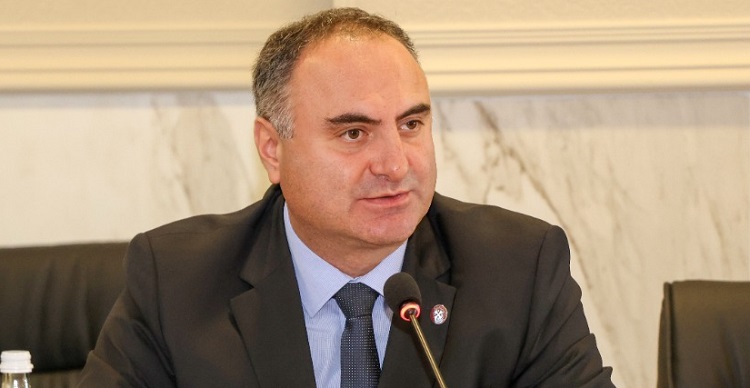Georgia’s total defence strategy, deterrence policy based on “existing needs” - Deputy Defence Minister

The Georgian Deputy Defence Minister Grigol Giorgadze spoke about Georgia’s defence policy, new code. Photo: Defence Ministry press office
Georgia’s total defence strategy and deterrence policy are aimed at “maximum strengthening” of the country’s self-defence capabilities based on “existing needs and absence of international security umbrellas”, Deputy Defence Minister Grigol Giorgadze told the Georgian Public Broadcaster on Tuesday.
In his interview for the channel, the official stressed Georgia needed to ensure “all necessary resources” in its own defence before the country’s integration into NATO.
Before the international community ensures its support for Georgia [through accepting the country under its security umbrella], Georgia will have to take actions for its own defence [...] with the use of its servicemembers, as well as the engagement of the whole public. All resources should be used for the goal”, Giorgadze said.
In comments on measures being taken by the Ministry in support of the goal, he pointed to “major changes” to the domestic defence system as part of the new defence code, which includes full transfer of the compulsory military service to the Defence Ministry from other bodies.
 The new defence code allows individuals to choose training programmes in accordance with their career decisions. Photo: Defence Ministry press office.
The new defence code allows individuals to choose training programmes in accordance with their career decisions. Photo: Defence Ministry press office.
Giorgadze said the move meant conscripts would undergo combat training under the Ministry “based on NATO standards”, adding his office would ensure “a range of preparatory works” for a smooth transition - including the update of its digital systems - before the launch of the new system from January 1, 2025.
Giorgadze noted the Ministry would offer six-, eight- and 11-month training programmes for recruits in accordance with their “career decisions”, in a reduction from the current 12-month period.
The official explained the six-month training programme would offer intensive training in combat units, while the eight-month programme would be related to provision of security for bases, depots and other strategic facilities, and the 11-month service would involve training for junior command positions like corporals and sergeants.
Students under the age of 23 who apply for the military training during their student years will be able to join a four-year programme - with intensive training courses taking up only one month of their time annually - or choose any of the offered programmes through postponement of their studies.
 Giorgadze said the new code provided further social guarantees for servicemembers. Photo: Defence Ministry press office.
Giorgadze said the new code provided further social guarantees for servicemembers. Photo: Defence Ministry press office.
Individuals will be able to pick the desired programmes on a digital platform before the official announcement of compulsory conscription. However, following the official announcement of conscription and in the case of absence of select programmes, the body will itself assign individuals to various programmes on the principle of random selection “based on the needs of the state”.
The Deputy Minister also said clergymen from any religious confession would be able to choose a 12-month alternative labour service - a paid job - instead of the compulsory military service. However, Giorgadze added they would receive smaller wages than other personnel in the same positions.
Rejecting claims by a part of the domestic political opposition that called compulsory military service system an example of “slavery”, Giorgadze pointed to similar systems being used in the foreign states like Denmark, Norway, Finland and Sweden.
Our model is basically the Finnish and the Estonian model, which itself comes out of the Swiss model, and is based on [the principle of] total defence - training as many people as possible”, Giorgadze said.
The country’s new defence code has already been submitted to the Parliament for approval.
 Tweet
Tweet  Share
Share